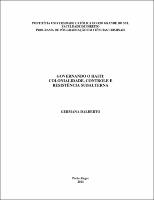| Share record |


|
Please use this identifier to cite or link to this item:
https://tede2.pucrs.br/tede2/handle/tede/4959| Document type: | Dissertação |
| Title: | Governando o Haiti : colonialidade, controle e resistência subalterna |
| Author: | Dalberto, Germana  |
| Advisor: | Gauer, Ruth Maria Chittó |
| Abstract (native): | Esta dissertação dedica-se a compreender as relações de colonialidade que têm operado as práticas de governo durante e após a colonização do Haiti, evidenciando as técnicas de controle impostas pelos governos intervenientes e as lutas de resistência levantadas pelos haitianos em resposta à violência colonial. Buscamos explorar, nos episódios centrais da história haitiana, as sucessivas políticas de segurança e criminalização empreendidas pelas numerosas ocupações estrangeiras, que, sob o pretexto do caos e proclamando a necessidade de restaurar a ordem em um país de negros incapazes de se governarem (Pierre-Charles, 1977:183), desembarcam suas tropas e procedem à ocupação militar/policial do terreno, intimidando sob todas as formas o movimento das massas haitianas. Como no tempo colonial, as recentes intervenções valem-se de discursos etnocêntricos sobre a crise das instituições do Estado haitiano, especialmente as de segurança pública, para se legitimarem e combaterem a ameaça que um país sem aparatos penais fortes representaria, conforme o modelo ocidental, à segurança internacional. Procuramos explorar as novas possibilidades criminológicas, incitadas pelo conceito de colonialidade do poder, de compreender as técnicas de controle e as violências impostas durante e após a colonização haitiana. Interessa-nos pensar essas práticas de opressão a partir dos que sofreram seus efeitos, procurando descrever como os aparatos de segurança foram instrumentalizados/moldados pelas políticas de colonização com o objetivo de aprofundar a cisão colonial e o binarismo que lhes são inerentes. Ao final, exploramos como as relações de colonialidade são estabelecidas e revigoradas pelas políticas de segurança das Nações Unidas. Busca-se compreender como o programa da ONU voltado ao estabelecimento de instituições ocidentais de controle do crime em países instáveis e inseguros, se insere num amplo movimento de democratização/pacificação de governos periféricos, conduzidos e intensificados pelo regime de segurança internacional após o fim da Guerra Fria. Abordamos como essas intervenções pró-democracia se fizeram na nação haitiana, com enfoque especial nas práticas de governo implementadas pela Missão das Nações Unidas para a Estabilização do Haiti (MINUSTAH). |
| Abstract (english): | This thesis is dedicated to understanding the relationships of coloniality that have operated government practices during and after the colonization of Haiti, showing the control techniques imposed by the intervening governments and the Haitian resistance struggles in response to the colonial violence. We seek to explore, in the central episodes of Haitian history, the successive security and criminalization policies undertaken by numerous foreign occupations, which, under the guise of chaos and proclaiming the need to restore order in a country of Blacks unable to govern themselves (Pierre-Charles. 1977:183), land their troops and proceed to the military/police occupation of the land, intimidating the movement of Haitian masses. As in colonial times, recent interventions make use of an ethnocentric discourse on the crisis of the Haitian state institutions, especially the ones related to public security, to legitimize and combat the threat that a country without a strong criminal apparatus represents, according to the Western model, to international security. We explore new criminological possibilities, incited by the concept of coloniality of power to understand the control techniques and the violence imposed during and after the Haitian colonization. We are interested in thinking about these practices of oppression from the standpoint of those who suffered their effects, focusing on how the security apparatus were instrumentalized/shaped by colonization policies aiming to deepen the colonial split and the binary logic inherent to them. Finally, we explore how relations of coloniality are established and invigorated by the security policies of the United Nations. We seek to understand how the UN program aimed at establishing Western institutions of crime control in unstable and unsafe countries is part of a wider movement for democratization/pacification of peripheral governments, led and intensified by the international security regime after the Cold War. We discuss how these pro-democracy interventions were made in the haitian nation, with special focus on the governance techniques implemented by the United Nations Mission for the Stabilization of Haiti (MINUSTAH). |
| Keywords: | HAITI - HISTÓRIA ONU COLONIALISMO SEGURANÇA PÚBLICA POLÍTICA CRIMINAL |
| CNPQ Knowledge Areas: | CNPQ::CIENCIAS SOCIAIS APLICADAS::DIREITO |
| Language: | por |
| Country: | BR |
| Publisher: | Pontifícia Universidade Católica do Rio Grande do Sul |
| Institution Acronym: | PUCRS |
| Department: | Faculdade de Direito |
| Program: | Programa de Pós-Graduação em Ciências Criminais |
| Citation: | DALBERTO, Germana. Governando o Haiti : colonialidade, controle e resistência subalterna. 2014. 63 f. Dissertação (Mestrado em Ciências Criminais) - Pontifícia Universidade Católica do Rio Grande do Sul, Porto Alegre, 2014. |
| Access type: | Acesso Aberto |
| URI: | http://tede2.pucrs.br/tede2/handle/tede/4959 |
| Issue Date: | 26-Feb-2014 |
| Appears in Collections: | Programa de Pós-Graduação em Ciências Criminais |
Files in This Item:
| File | Description | Size | Format | |
|---|---|---|---|---|
| 460177.pdf | Texto Parcial | 546 kB | Adobe PDF |  Download/Open Preview |
Items in DSpace are protected by copyright, with all rights reserved, unless otherwise indicated.




